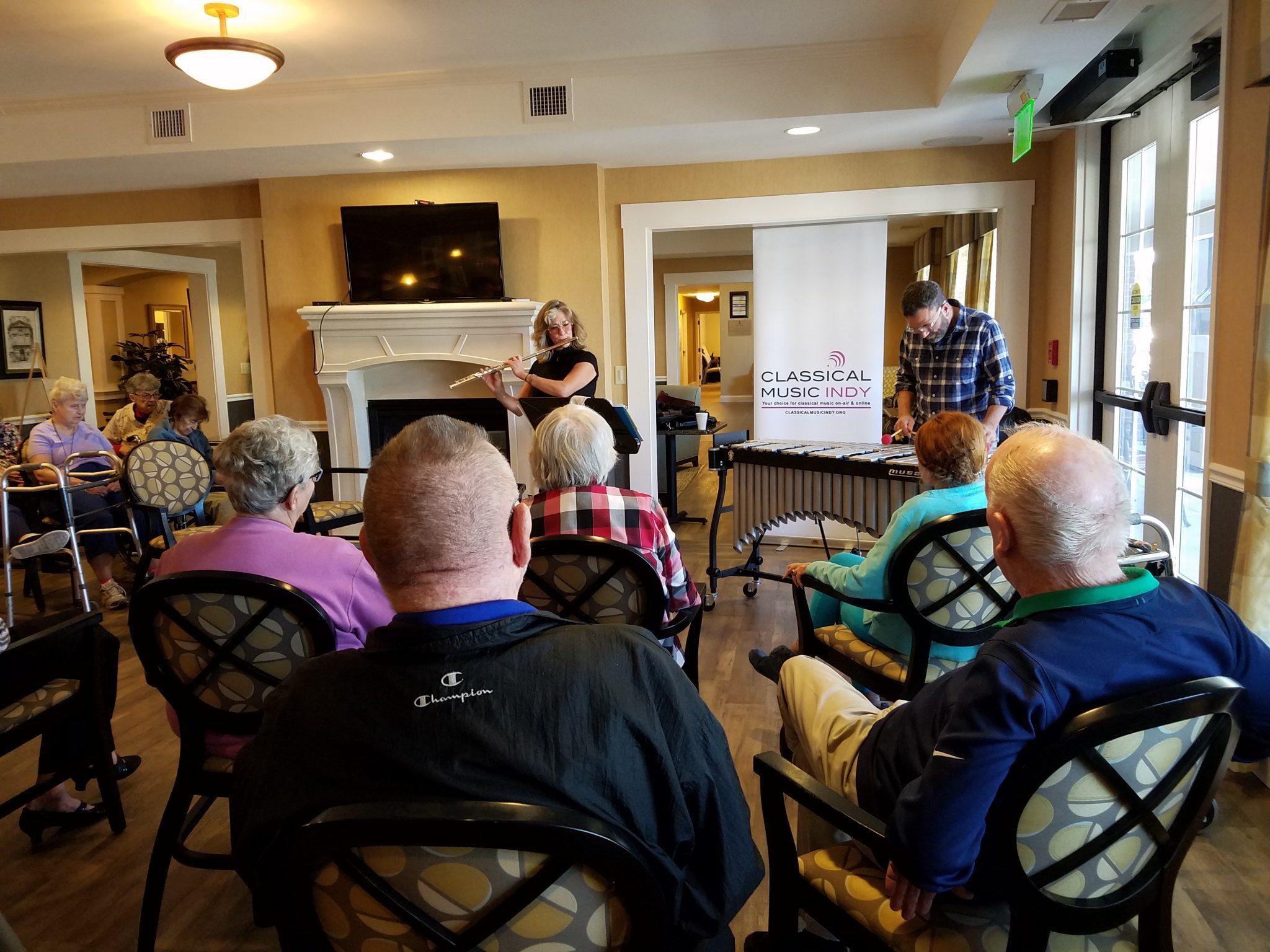A flagship program for Classical Music Indy, the Senior Concert Series brings music to those who are unable to travel to see performances. Ad hoc chamber ensembles perform in care facilities, providing emotional release and social opportunities for residents. Words by Crystal Hammon. Adapted from Classical Music Indy’s NOTE Magazine.
Senior Concerts Have Social Impact
It’s just after lunch on a December afternoon at the Homewood Health Campus, and residents of this Lebanon, Indiana assisted care center are making their way toward a common living room, furnished in comfortable, overstuffed sofas and chairs. A row of 20 to 30 small Christmas trees forms an L-shape on two sides of the room, where a few dozen seniors gather around a Classical Music Indy banner and four empty chairs. 
They’re a patient audience, watching one of winter’s first snowfalls while they wait. Suddenly the front doors pop open, allowing a gust of cold air — and youth —to blow through the room. With their instruments in tow, four professional musicians stride toward the empty chairs and set up for a concert.
The ad hoc string quartet will play for an hour, performing classical music along with Christmas tunes. It’s just one of many concerts in an ongoing series for seniors, organized by Classical Music Indy as part of its Music Unites programming. The quartet is drawn from a pool of carefully-selected musicians invited to perform. Their mission is to bring classical music to residents in assisted care, memory care and rehabilitation centers in central Indiana.
“When I’m choosing music for our ensembles, I usually pick familiar classical tunes people will know, like a Bach piece that’s been in popular culture,” says Bethany Daugherty, a Classical Music Indy violinist. “If people aren’t familiar with classical music, that gives them something to hang on to. We also use hymns, which are a really great way for people to connect with the music.”
Daugherty is convinced that the music they share makes a meaningful difference for seniors. “I grew up in a family where we all played instruments, and we would go around and perform for nursing homes and churches, so it’s something I’ve always done,” she says. “I really love the opportunity to bring music into senior communities.” The concerts are an opportunity to continue a family tradition and pay tribute to her grandmother, a former Homewood Health Campus resident who loved music.
Daugherty says she typically leaves feeling refreshed. Judging by the audience’s reactions and the conversations they share with musicians afterwards, the feeling is mutual. “It’s a breath of fresh air to have music of this caliber brought to us,” says 84-year-old Jim P., a retired farmer and World War II veteran who enjoyed piano lessons as a child. During retirement, Jim resumed his study of music and taught himself to play the organ.
When the concert ends, he approaches one of the musicians to share his musical background and to marvel over the music. “That arrangement of Silent Night in three keys,” Jim says. “The excitement just builds with every change in key. Something there will influence how I play. You can always learn by listening to other musicians.”
Most Classical Music Indy musicians are in their 20s and 30s, and Daugherty says they love hearing stories, engaging with seniors and seeing them tap their toes, or sing along with familiar music. Sharing music is the emphasis of the concert series, but the social interactions between generations may be just as important, according to Eric Salazar, assistant director of community engagement at Classical Music Indy. Social isolation is a big concern for people who live in senior communities where contact with family and friends may be limited.
Along with their musical prowess, Salazar says the artists bring a framework of understanding that helps them relate to seniors. That trait is obvious, whether they are choosing relevant music, conversing with members of the audience or noticing that someone is dozing during a concert. “As musicians, we can’t heal or cure, but if someone gets a good rest because they feel relaxed and peaceful, maybe we’ve had a hand in making them feel a little better that day,” he says.








Leave a Reply